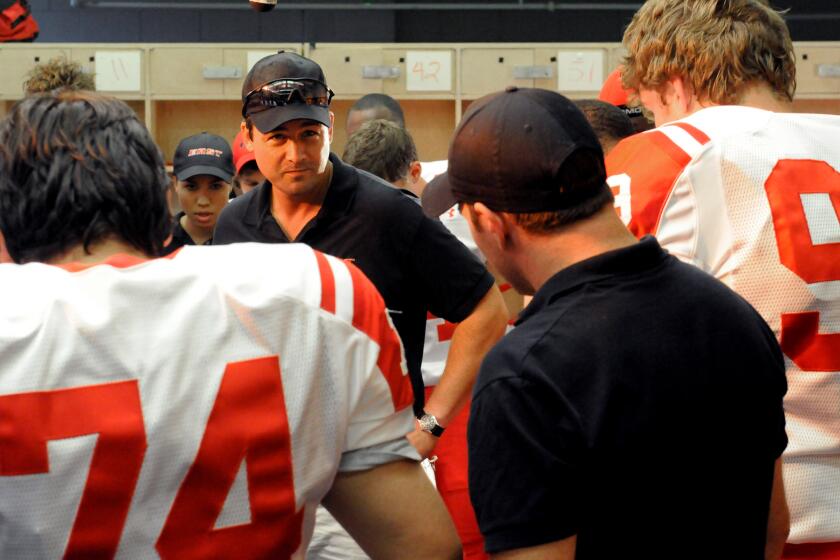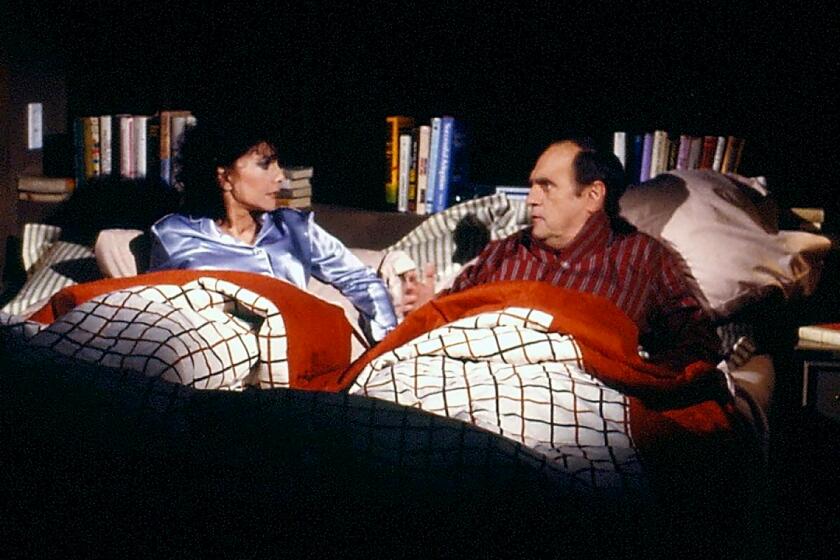For PBS at Least, ‘Baseball’ Is a Hit--but It’s No ‘Civil War’ : Television: Ken Burns’ epic is attracting a large audience by the network’s standards, but not as large as his previous miniseries.
Is “Baseball,” Ken Burns’ epic PBS miniseries following his landmark work “The Civil War,” a ratings hit or a miss? It’s a question akin to the classic inquiry about whether the glass is half empty or half full.
By PBS standards, the first week of “Baseball” was outstanding, attracting an audience 2 1/2 times larger than the average public-television program. But by commercial network standards, its ratings so far would probably be dubbed a disaster--especially because $2 million was spent by General Motors alone on advertising, promotion and educational projects. And that doesn’t begin to encompass the mounds of free publicity “Baseball” acquired through splashy magazine and newspaper articles and countless TV appearances by Burns--a clear media home run.
In its first five nights last week, the nine-part “Baseball” averaged a 5.1 rating in 32 major markets (national ratings for PBS are not yet available), attracting about 7% of the available viewers.
*
Assuming the national rating is about the same, that would make “Baseball” one of the least-watched programs on television last week when compared with the fare on ABC, CBS, NBC and Fox. The 5.1 rating that the first episode got on Sept. 18 would have ranked 84th out of 85 prime-time programs on the A.C. Nielsen weekly ratings list.
Moreover, “Baseball” didn’t perform nearly as well as “The Civil War” did in September, 1990. Matching the 24 markets that were measured then, the five nights of “Civil War” had an average 8.9 rating and 13% share of the audience vs. “Baseball’s” 5.5 rating and 8% of the audience.
“Civil War” was 11 hours; altogether when its “game” is over, “Baseball” will have aired 18 1/2 hours. It cost $8 million to produce.
In “Baseball’s” win column, however, is the fact that the 5.1 rating in 32 markets is 155% better than public television normally does in prime time. PBS averages a 2 rating and a 3% share of audience.
“We’re thrilled with that,” said John Fuller, director of PBS research.
Did “Baseball” do as well as it was supposed to, or did the stunning performance of “Civil War” unreasonably enhance expectations? And what role did the Major League Baseball strike play--enlarging audiences who missed seeing men run around the bases, or turning fans off in anger?
Fuller insisted that he didn’t think “anybody in their right mind expected ‘Baseball’ to do what ‘Civil War’ did. It’s different subject matter--it’s about a sport. ‘The Civil War’ was one of those shows like ABC’s (1977 miniseries) ‘Roots’ that touched a national nerve. While ‘Baseball’ certainly has plenty of emotional elements (but they didn’t) drive the series, like slavery did.”
Asked why, then, “Baseball” got 7 1/2 hours more than “Civil War,” Fuller replied: “That’s Ken Burns. We weren’t the ones who decided how long to make it.”
He added that the ratings changed each night of “Baseball”--”one a little lower, one a little higher, and all in all it’s holding up.” Its best night last week was Wednesday--a 5.6 rating and 9% share when it concentrated on Babe Ruth. The other four nights drew a 7% share. The worst ratings were on Tuesday, at 4.6, which dealt with baseball’s first decade of the 20th Century.
Commercial network executives tended to dodge the question of whether they would be disappointed with “Baseball’s” ratings based on what was spent to promote it. Some opted not to discuss the matter at all.
*
Larry Hyams, ABC’s vice president of audience analysis, also used the “Roots” analogy, saying that “Civil War” was in a class by itself. So, if he were at PBS, he said, “I’d be quite happy” that “Baseball” is “doubling and tripling its audience levels.”
But Hyams also noted that “18 1/2 hours is an awful lot.”
“Not everybody is a baseball fan,” he said. “The Civil War was a turning point in the country’s history. Maybe not that many people care about what happened in the 1860s with baseball.”
He added that “the topic (of baseball) is somewhat narrow”--skewed to an older, male audience. “It doesn’t have that much female appeal.”
And, he said, “the strike hurt,” creating “a backlash against watching anything like ‘Baseball.’ ”
George Schweitzer, CBS’ executive vice president for marketing and communications, agreed. “I guess the real issue is, is there an appetite for baseball? It doesn’t knock the quality of the show.”
Baseball has “a narrower appeal” than did “The Civil War,” Schweitzer noted. “A documentary on baseball is not as good as a baseball game. . . . There is no baseball and no interest in baseball, and people are finding other things to do without baseball.”
PBS’ Fuller said he was waiting for the ratings for the final installments, which began Sunday and conclude Wednesday night: “We must wait and see how many people come back.”
John Maciarz, a public relations and marketing executive for General Motors, the major corporate backer of “Baseball,” said last Friday that he was happy with the results thus far. “We still have the week to go, and we still have some powerful episodes. Bottom line--we’re not disappointed.”
The complete guide to home viewing
Get Screen Gab for everything about the TV shows and streaming movies everyone’s talking about.
You may occasionally receive promotional content from the Los Angeles Times.



